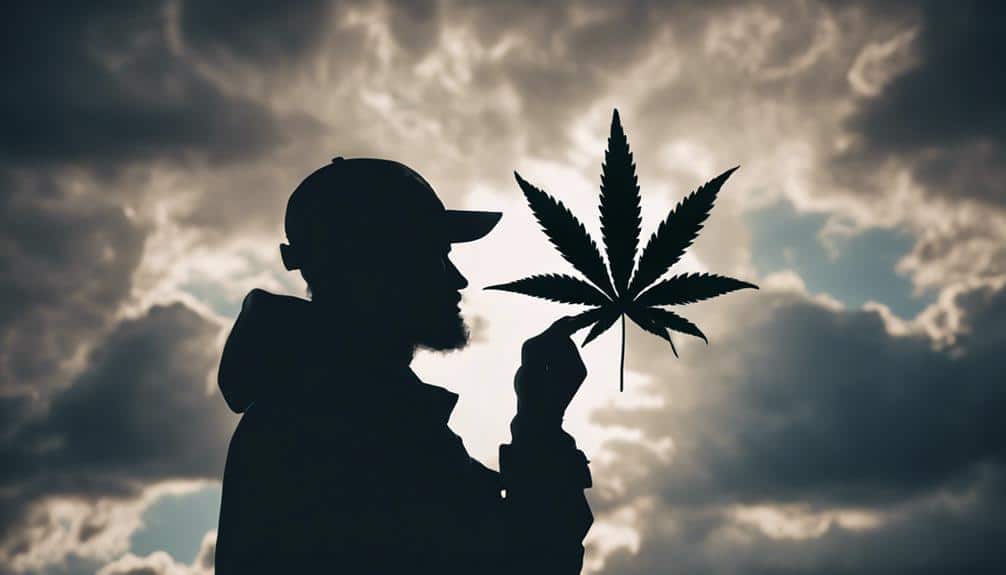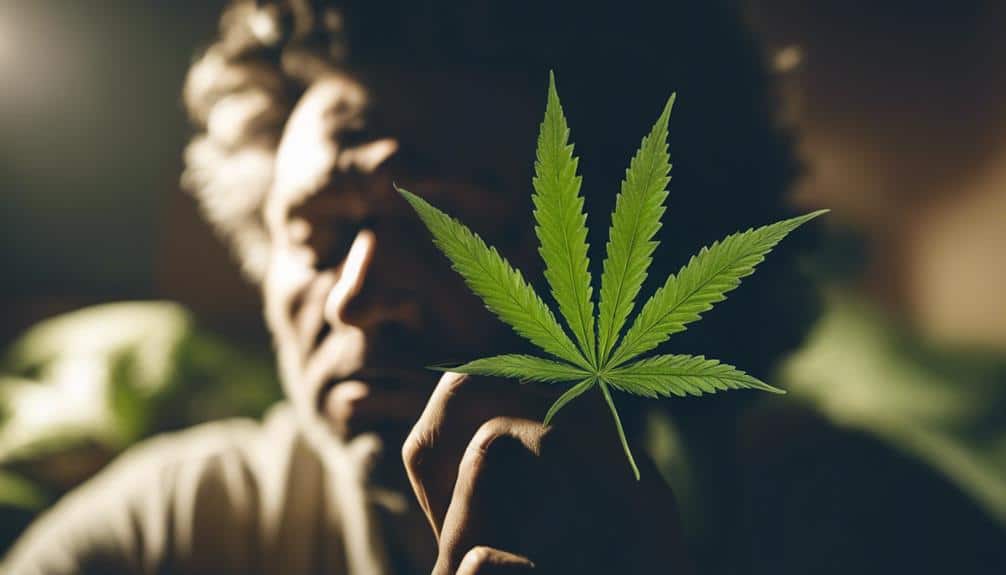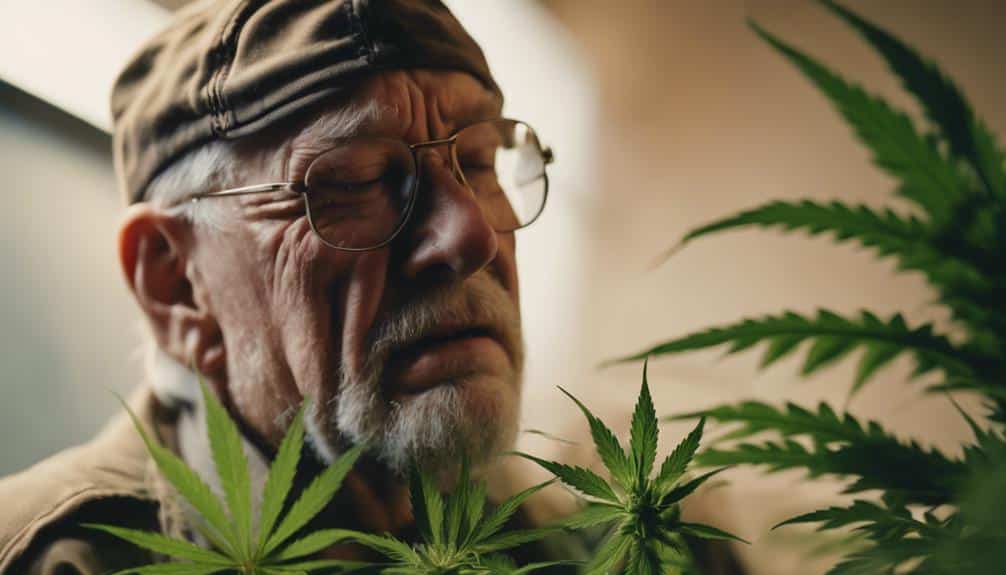Imagine you’re a veteran grappling with chronic pain and PTSD, struggling to find relief through traditional treatments. Medical marijuana emerges as a potential solution, offering hope in alleviating anxiety, nightmares, and unrelenting pain. As intriguing as it sounds, there’s a myriad of factors to consider such as the effects of different strains and dosages, and the importance of consulting with healthcare providers. Interested in exploring this alternative approach to improving your well-being? Stick around as we navigate the complexities of this captivating topic.
Understanding PTSD and Chronic Pain

To fully appreciate the potential benefits of medical marijuana for veterans, it’s crucial to first gain an understanding of Post Traumatic Stress Disorder (PTSD) and chronic pain—two significant health challenges that veterans often face.
PTSD is a mental health condition triggered by a terrifying event. It manifests in symptoms like flashbacks, nightmares, severe anxiety, and uncontrollable thoughts about the event. The origins of these PTSD symptoms often lie in the horrific experiences veterans encounter during service. Unpredictable and intense, these symptoms can disrupt daily life and cause immense suffering.
Chronic pain on the other hand is persistent pain that lasts weeks to years. The origins of chronic pain in veterans can range from physical injuries sustained in combat to the mental strain of war. This relentless pain can impact quality of life, sleep quality, and mental health.
It’s important to underscore that these conditions aren’t just health issues; they’re barriers that prevent our veterans from living their lives fully. As individuals who desire to serve others, understanding the depth and breadth of these conditions is the first step in advocating for potentially beneficial treatments like medical marijuana.
Traditional Treatments for Veterans
While understanding PTSD and chronic pain offers insight into the struggles veterans face, it’s equally important to examine the traditional treatments currently available to them. Veteran Rehabilitation, a cornerstone of these treatments, often involves a range of therapies designed to address both physical and mental health issues. It focuses on improving quality of life by helping veterans regain independence and functionality lost due to trauma and stress.
Trauma Therapy plays a critical role in the rehabilitation process. Techniques such as Cognitive Behavioral Therapy (CBT), Prolonged Exposure (PE), and Eye Movement Desensitization and Reprocessing (EMDR) are commonly used. These therapies work by helping veterans understand and change thought patterns that lead to harmful behaviors or feelings of distress.
However, these traditional treatments often come with their own challenges. They require a significant time commitment and can be emotionally draining. Some veterans may also experience side effects from medications used in their treatment. This combination of factors can create hurdles in the healing journey, underscoring the need for alternative supplementary approaches to address complex needs and improve the wellbeing of our veterans.
Medical Marijuana: An Overview

Diving into the realm of alternative treatments, medical marijuana emerges as a potential solution, offering a unique blend of therapeutic benefits that may address the multifaceted health challenges faced by veterans. The meticulous process of cannabis cultivation yields a plant rich in compounds like THC and CBD that interact with the body’s endocannabinoid system, potentially providing relief from chronic pain, anxiety, and depression.
However, it’s vital to understand the potential side effects of marijuana. These may include dizziness, dry mouth, paranoia or an altered state of consciousness. Long-term use can also lead to dependency or addiction in some individuals.
Yet many veterans attest to the relief they’ve found in medical marijuana where conventional treatments have failed. It’s crucial to weigh the potential benefits against possible side effects.
Medical marijuana isn’t a one-size-fits-all solution. Its therapeutic potential varies from person to person and it may not be suitable or beneficial for everyone. The decision to use medical marijuana should involve careful consideration and discussion with a healthcare provider taking into account each individual’s unique health situation and needs. Indeed in the quest to serve our veterans better it’s essential to explore all avenues including medical marijuana.
Studies on Marijuana and PTSD
A growing body of research is shedding light on the potential of medical marijuana in treating Post Traumatic Stress Disorder (PTSD), a condition that’s notably prevalent among veterans. Studies indicate that therapeutic cannabis may offer significant relief for PTSD symptoms representing a promising alternative for those who’ve found traditional treatments ineffective.
Researchers are particularly interested in how cannabinoids—the active compounds in cannabis—interact with the endocannabinoid system in your brain. This system plays a crucial role in managing stress responses and imbalances within it are thought to contribute to PTSD. Therapeutic cannabis with its rich supply of cannabinoids may help restore balance and alleviate symptoms.
Studies have shown promising results with many veterans reporting a reduction in nightmares, flashbacks, and severe anxiety. Moreover, many found that cannabis improved their sleep quality—a common issue among PTSD sufferers.
But it’s not a one-size-fits-all solution. Different strains and dosages can have varied effects and it’s important to seek professional guidance. Remember the goal is to enhance your wellbeing and quality of life. As research continues we hope to refine our understanding and make therapeutic cannabis an effective personalized treatment for veterans living with PTSD.
Cannabis for Chronic Pain Relief

Beyond the realm of PTSD medical marijuana is also gaining traction as an effective remedy for chronic pain—a condition that many veterans grapple with daily. As a potential treatment, the benefits of cannabis can’t be overstated. It’s a game-changer for chronic pain sufferers offering relief where traditional painkillers fail.
There are different ways to approach cannabis use for chronic pain relief, revolving around the choice of Cannabis Strains and Dosage Guidelines. To guide you here are three key points to consider:
- Understanding Cannabis Strains: Not all cannabis is created equal. Indica strains, for instance, are often recommended for pain relief and relaxation while Sativa strains may be more energizing.
- Determining the Appropriate Dosage: Start low, go slow is a common mantra in the medical cannabis community. It’s imperative to understand your body’s reaction to cannabis and adjust the dosage accordingly.
- Consulting with Professionals: Always seek advice from healthcare providers knowledgeable about medical cannabis. They can provide personalized advice on strains and dosage.
You’re not alone in this journey. As we continue to understand the potential of medical cannabis it becomes more crucial to ensure its benefits reach those who need them most like our veterans.
Legal Implications and Access
Navigating the legal landscape of medical marijuana can be a daunting task for veterans as regulations vary widely from state to state and federal law complicates matters further. The policy evolution in this area is marked by a conflict between state and federal laws which can lead to confusion and consequently accessibility barriers.
As you strive to serve our veterans understanding these legal intricacies is crucial. Federal law still classifies marijuana as a Schedule I drug making it illegal. However many states have legalized medical marijuana creating a gray area that can be difficult to navigate. This discrepancy can hinder veterans’ access to potentially beneficial treatment.
Moreover, the Department of Veterans Affairs governed by federal law doesn’t facilitate access to medical marijuana even in states where it’s legal. This restriction can further impede the accessibility of this alternative treatment option for veterans suffering from PTSD and chronic pain.
Conclusion
Navigating the warzone of PTSD and chronic pain is a daunting feat for veterans. Traditional treatments may fall short making the journey feel like a never-ending battle. But medical marijuana like a trusted ally presents a beacon of hope. It’s not magic but studies suggest it could offer relief.
I’d like to personally invite you to visit us at Fells Point Cannabis Docs of Maryland to learn more. Our team is committed to providing valuable information and guidance on the potential benefits of medical marijuana for veterans. We understand the unique challenges you face and we’re here to support you every step of the way.
Give us a call, we’d love to help you explore this potential path to tranquility. After all, every veteran deserves a shot at a pain-free peaceful life.
